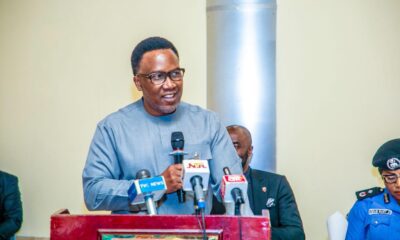Editorial
Preparing for a challenging farming season: NiMet’s forecast and the need for proactive action

As the farming season beckons, Nigerian farmers are bracing themselves for a turbulent ride. The Nigerian Meteorological Agency’s (NiMet) forecast of a delayed and shorter rainy season has sent shockwaves across the agricultural community, threatening to upend the delicate balance of our food security.
With millions of farmers poised to plant their crops, the clock is ticking. Will our policymakers and stakeholders rise to the challenge, or will we reap a harvest of regret? According to NiMet, this year’s rainy season will commence later than usual, with the central states expecting the onset of rains around May 29 and the northern states around June 13.
Moreover, the season is predicted to end earlier than usual, between October 6 and November, in many states. This forecast raises concerns for farmers, as a shorter rainy season can lead to reduced crop yields and increased risk of drought.
To mitigate these challenges, NiMet advises planting early-maturing crop varieties at the beginning of the season. This is a wise recommendation, as it allows farmers to adapt to the predicted weather patterns and minimize potential losses.
With predictions ranging from October 6 to November, regions including Yobe, Jigawa, Sokoto, and Lagos are bracing for a shorter agricultural window. This forecast emphasised the critical importance of proactive planning and early adoption of fast-maturing crop varieties.
The essence of NiMet’s warning is clear: farmers must act swiftly to secure the necessary resources for a successful harvest. From fertilizers to seeds, the time to procure vital inputs is now, to mitigate potential setbacks and ensure a fruitful season. Traditionally, this period marks the commencement of government initiatives to facilitate the purchase and distribution of agricultural inputs. However, the silence on this front is deafening.
Instead of prioritising the long-term sustainability of agriculture, many officials seem fixated on short-term palliative measures, neglecting the imperative of future agricultural prosperity. As the countdown to the abbreviated season begins, the call to action grows louder. Farmers must seize the moment, equipping themselves for the challenges ahead, while policymakers must refocus their attention on fostering a resilient agricultural sector for generations to come.
Only through collective effort and foresight can we navigate the uncertain terrain ahead and ensure a bountiful harvest for all. As the federal government pledges to revamp the textile industry, Nigerian farmers are grappling with a more pressing concern – the exorbitant cost of fertilizers and other essential inputs. A bag of fertilizer now costs a staggering N48,000, forcing farmers to either purchase substandard products or resort to traditional alternatives, resulting in poor yields and revenue losses. The high costs of seeds, herbicides, pesticides, labour, and fuel have pushed small-holder farmers to the brink.
Despite President Bola Ahmed Tinubu’s assurances of support, including a promise to release 225,000 metric tons of fertilizers, seedlings, and other inputs in August 2023, concrete actions are yet to be seen. With food prices soaring nationwide, it is imperative that the government takes immediate steps to address the plight of farmers, who are crucial to the nation’s food security.
We urge the government to translate its promises into tangible support for farmers, including affordable access to quality inputs, to ensure a bountiful harvest and a food-secure future for Nigeria. We commend the Central Bank of Nigeria’s release of 2.15 million bags of fertilizer to the Federal Ministry of Agriculture and Food Security. However, it is alarming that there has been no update on the distribution of this vital commodity since the handover over a month ago.
Furthermore, we urge state governments to take their responsibilities in ensuring adequate input supply to farmers more seriously. We also call on the federal government to implement policies that facilitate the supply of fertilizers, seeds, and other inputs to the markets, thereby controlling rising prices.
The Presidential Fertilizer Initiative needs to be reviewed to ensure fertilizer blending plants resume production. Our farmers urgently need government support to access necessary inputs for successful cultivation. As the rains continue to falter, Nigerian farmers face an uphill battle. We urge the government to seed hope by providing essential resources – quality seeds, fertilizers, and equipment – to help them weather the storm.
Climate-resilient agriculture initiatives and weather insurance schemes will also help farmers adapt and thrive. But, there’s a greater challenge to tackle – the menace of bandits and militias terrorizing farmers, forcing them off their lands, and threatening our food security.
It’s time for decisive action! The government must act swiftly to protect our farmers, their farms, and our collective future. Let’s join forces to cultivate a brighter tomorrow, where our farmers can plant, grow, and harvest without fear. The time to act is now, for the sake of our nation’s food security and stability. Let’s sow the seeds of resilience and reap a bountiful harvest for generations to come!
Editorial
The need for prudence and foresight in managing natural resources


Nigeria’s recent achievement in extending its continental shelf by 16,300 square kilometers is a landmark victory that solidifies its position as a major maritime nation.
This feat, announced by President Bola Tinubu, is a testament to the country’s unwavering commitment and scientific prowess.
The journey to this triumph was long and arduous, spanning over a decade of meticulous research, diplomatic negotiations, and persistent lobbying efforts.
The significance of this achievement cannot be overstated. By expanding its maritime boundaries, Nigeria has not only secured a valuable asset for future generations but also demonstrated the importance of diplomacy and international cooperation in resolving disputes and advancing shared interests.
The responsible exploitation of these newfound resources could catalyse economic growth, create employment opportunities, and generate revenue streams that could be channeled into critical areas such as infrastructure development, education, and healthcare.
As Nigeria prepares to capitalise on this newfound bounty, it is imperative that the government exercise prudence and foresight in its management of these resources.
Lessons must be learned from the mismanagement and environmental degradation that have plagued the oil-rich Niger Delta region. A comprehensive and sustainable development plan, centered on transparency, environmental stewardship, and equitable distribution of wealth, must be formulated.
This plan should prioritise the diversification of the economy, investing in renewable energy sources, and promoting sustainable fishing and maritime industries.
A portion of the revenue generated from these resources should be allocated towards addressing the pressing challenges faced by coastal communities, such as sea-level rise, coastal erosion, and marine pollution. By investing in resilient infrastructure, climate adaptation measures, and environmental conservation efforts, Nigeria can ensure that the benefits of its maritime resources are enjoyed by present and future generations alike.
As the world grapples with the existential threat of climate change and the growing importance of the blue economy, Nigeria’s achievement serves as a beacon of hope and a reminder of the immense potential that lies beneath the waves.
With judicious stewardship, international cooperation, and a commitment to sustainable development, Nigeria can harness the power of its maritime domain to forge a prosperous and resilient future for its people.
This victory belongs not only to the dedicated team of experts who tirelessly pursued this endeavour but to every Nigerian. As the country embarks on this new chapter, it is incumbent upon all stakeholders to work in unison, ensuring that the fruits of this achievement are equitably shared and that the foundations are laid for a thriving, sustainable blue economy that will benefit generations to come.
Experts have pointed to the potential for hydrocarbons, gas, solid minerals, and a variety of sedentary species within Nigeria’s expanded maritime boundaries, enhancing the country’s significant energy and maritime resources.
However, Professor Larry Awosika, a member of the Hydrocarbon Pollution and Remediation Project (HPPC), has emphasised the need to safeguard sensitive data acquired during surveys to protect Nigeria’s interests and possibly monetise the information to recoup project costs.
This newspaper underscores the immense significance of this achievement. By extending its maritime boundaries, Nigeria has bolstered its status as a major player in the global blue economy and secured a valuable asset for future generations.
Responsible exploitation of these newfound resources could drive economic growth, create jobs, and generate revenue that could be invested in critical sectors such as infrastructure, education, and healthcare.
Moreover, this success underscores the importance of diplomacy and international cooperation in resolving disputes and advancing common interests.
Nigeria’s achievement was realised through adherence to international law and constructive engagement with the United Nations and its member states, contrasting sharply with the frequent resort to armed conflict over territorial disputes.
President Tinubu’s praise for the team for “gaining additional territory for the country without going to war” is well-deserved.
Nigeria has shown that complex territorial issues can be resolved peacefully, setting an example for other nations facing similar challenges.
As Nigeria looks to capitalise on this new opportunity, it is crucial that the government manage these resources with prudence and foresight.
Lessons must be learned from the mismanagement and environmental damage in the oil-rich Niger Delta, where benefits have been unevenly distributed and ecological consequences severe.
We advocate for a comprehensive and sustainable development plan centered on transparency, environmental stewardship, and equitable wealth distribution.
This plan should prioritise economic diversification, investment in renewable energy, and promotion of sustainable fishing and maritime industries to ensure long-term stability and job creation.
Additionally, a portion of the revenue from these resources should address pressing coastal challenges such as sea-level rise, erosion, and pollution.
As the world faces the existential threat of climate change and the growing importance of the blue economy, Nigeria’s achievement is a beacon of hope, highlighting the potential beneath the waves. With careful stewardship, international cooperation, and a commitment to sustainable development, Nigeria can leverage its maritime domain for a prosperous and resilient future.
Editorial
State Govts, fix our roads, stop the carnage now!


In just three short months, 295 lives have been lost and 315 people injured in road accidents across 24 states and the Federal Capital Territory. Ogun State and Kwara State have been particularly hard hit, with 43 and 28 fatalities respectively.
The sheer scale of this tragedy calls for an urgent need for unwavering action to tackle the scourge of road accidents in Nigeria.
As we mourn the loss of precious lives, we must also ask ourselves: what can be done to prevent such carnage on our roads?
It is alarming that the causes of these accidents remain unchanged over the years, indicating a lack of meaningful progress in addressing the underlying issues. The status quo is unacceptable, and it is imperative that we take concrete steps to tackle this national crisis.
The deplorable state of our roads is a significant contributor to the alarming rate of accidents. Crumbling infrastructure forces drivers to navigate treacherous potholes, leading to avoidable tragedies.
It’s disheartening that governors prioritise building flyovers in capital cities while neglecting other critical road networks. Even when efforts are made to repair these roads, they often deteriorate rapidly due to subpar construction.
Furthermore, the roadworthiness of vehicles plying our roads is a major concern. Commercial vehicles, in particular, are often operated with worn-out tires, faulty brakes, and poor lighting, putting lives at risk. Enforcement agencies tasked with ensuring compliance frequently fail to do their job, and when they do, they prioritize revenue generation over safety.
Corruption also allows unqualified drivers to operate vehicles, further compounding the problem.
To make matters worse, some drivers operate under the influence of alcohol, posing a significant threat to themselves and others. It’s imperative that we address these systemic issues to reduce the number of accidents and ensure safer roads for all.
Nigerians’ driving habits are a significant concern, requiring extra caution on our roads due to the prevalent poor road manners. Many drivers exhibit impatience and disregard for basic traffic rules, such as stopping at traffic lights.
Commercial vehicle drivers often prioritise quick profits over safety, overloading their vehicles and even using goods vehicles to transport passengers.
To address the urgent need for improvement, our law enforcement agencies must take their responsibilities seriously.
The Federal Road Safety Corps and directorates for road traffic services must shift their focus from revenue generation to ensuring proper driver licensing, vehicle roadworthiness, and enforcing traffic regulations. By doing so, we can significantly reduce road accidents in a short time. It’s time for a change in attitude and a commitment to safety on our roads.
It is crucial for them to intensify efforts in educating the public on the importance of following basic traffic rules and ensuring that vehicles on the roads are roadworthy. This can be achieved through cooperation with various road unions to educate drivers.
Federal and state governments also have a responsibility to provide Nigerians with good road networks. The current state of many roads, which can be described as death traps, is unacceptable. We urge state governors to prioritise fixing the numerous roads in their regions over constructing flyovers in state capitals to ensure the safe movement of people and goods.
Additionally, we strongly advocate for the strict enforcement of laws against drivers whose reckless behavior results in the loss of lives. It must be made clear that such reckless actions will not be tolerated, or the situation will only worsen.
More importantly, Nigerians must learn to observe basic traffic rules and respect each other on the road. Being patriotic and law-abiding citizens is essential for ensuring a prosperous and peaceful nation. This responsibility begins with each one of us.
The persistence of these avoidable tragedies requires a multifaceted approach. We must improve road safety infrastructure, enforce traffic regulations, and promote public awareness campaigns.
It is important to address the root causes of these accidents, such as reckless driving, poor vehicle maintenance, and inadequate emergency response systems.
Also, the Governments should implement mandatory retraining programs for drivers who have been involved in accidents or have multiple traffic violations. This can help improve driving skills and awareness of traffic rules.
Meanwhile, there should be enhancement of emergency response systems to ensure timely and efficient medical assistance for accident victims. Quick response times can significantly reduce fatalities and severe injuries.
Launching community engagement programs to educate the public about road safety which may involve local communities can help create a culture of safety and responsibility among road users.
Editorial
Nigerians groan under high cost of living


Barely fourteen days to the first year anniversary of this federal government, Nigerians have continued to groan under high cost of living, amidst a catalogue of failed promises. Despite its chants of ‘Renewed Hope Agenda,’ a cup of garri/rice has since gone out of the reach of an average Nigerian. There is a continuous hike in fuel and other petroleum products. Transportation fares, local, inter-state or international are a no-go area. Nigerians have lost count of pledged dates for the commencement of operations or production of our refineries, especially Port Harcourt Refinery.
Most citizens have lost hope in the current political leadership in the country. Fuel today is being sold at between N800 to N950 per litre and still counting. A bottle of kerosene is about N2,000 and this an essential product being used by almost 90 percent of the population, especially the lower cadre. In the past, the colour of kerosene used to be like spring water from a rock, but today the product is sullied with impurities, its colour of kerosene almost like that of groundnut oil. Yet, it remains scarce and costly. What a country.
Nigeria is possibly the only country with abundant crude oil deposits that prefers to throw away the crude at giveaway price to other countries in the name of exportation, only to buy the refined products from the crude at exorbitant prices, in the name of importation. The first refinery in Port Harcourt was built about nine years after oil was discovered in commercial quantity in Oloibiri in 1956 in the present day Bayelsa State. And up till today there is no intentional attempt to rebuild it, or be religious in maintaining it.
The Naira debuted as the national currency of Nigeria, at 75K to $1, but today N1,500 is exchanging $1. Yet, we are ranked among the highest producers of oil and gas in the comity of nations. The unadulterated truth is this: Nigerians are suffering in the midst of plenty which should not be the case.
The poor leadership of the old brigade, who have held sway since independence, should leave the stage for younger generation. The current President of France, Emmanuel Macro is below forty years. The recent election in Senegal produced a 44-year-old man as president. Whether we like it or not, once a person passes retirement age of 60, his mental faculty starts dropping.
Inflation rate is now 33-35% in the country. Unemployment rate is soaring and the Federal Government had the gut to propose N48,000 as minimum wage for Nigerian workers, possibly as part of the ‘renewed hope agenda.’ This is as against N860,000 being proposed by the organised labour, comprising the Nigeria Labour Congress (NLC) and Trade Union Congress(TUC).
We are not surprised therefore when the organised labour walked out of the negotiation table and handed down a 14-day ultimatum to the Federal Government to think right.
We hope the federal government will really do all it needs to do to avoid another showdown with Nigerian workers who are like wounded lions and have been patient enough with the economic torture currently being experienced by workers in the country. We hope and pray that the tail of a sleeping tiger, will not be unnecessarily pulled. It could amount to unpleasant consequences. The government should fulfil its campaign promises and ensure peace and tranquility throughout the nation.
-
Finance4 months ago
Court orders Sen. Victor Umeh to repay N136m bank debt to AMCON
-



 Abuja Update3 months ago
Abuja Update3 months agoUNDP, FG partnership needed to achieve inclusion, equity- Minister
-
Abuja Update2 months ago
Banks drive stock market performance with N147bn gain
-
capital market2 years ago
Rt.briscoe, FBNH, Others halts negative performance of stock market
-
Submission Guidelines5 months ago
CALL FOR SUBMISSIONS: POETRY COLUMN-NND
-



 Health1 month ago
Health1 month agoCapacity training will reduce migration of health workers- NPHCDA
-



 Business4 weeks ago
Business4 weeks agoTingo Group unveils Tingo Electric, Tingo Cola drink at Lagos launch
-
News5 months ago
Oil thieves sponsoring malicious media campaign against Navy – Spokesman











Bello Buba Badara
April 29, 2024 at 11:51 pm
Thanks